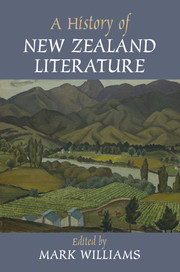Book contents
- Frontmatter
- Contents
- Notes on Contributors
- Acknowledgments
- Introduction
- PART I 1760–1920
- PART II 1920–1950
- PART III 1950–1972
- 11 Against the Social Pattern: New Zealand Fiction, 1950–1970
- 12 Janet Frame: Myths of Authorship, 1950–1990
- 13 Te Ao Hou: Te Pataka
- 14 Out of the Drawing Room and onto the Beach: Drama, 1950–1970
- 15 ‘Physician of Society’: The Poet in the 1950s and 1960s
- PART IV 1972–1990
- PART V 1990–2014
- Index
11 - Against the Social Pattern: New Zealand Fiction, 1950–1970
from PART III - 1950–1972
Published online by Cambridge University Press: 05 April 2016
- Frontmatter
- Contents
- Notes on Contributors
- Acknowledgments
- Introduction
- PART I 1760–1920
- PART II 1920–1950
- PART III 1950–1972
- 11 Against the Social Pattern: New Zealand Fiction, 1950–1970
- 12 Janet Frame: Myths of Authorship, 1950–1990
- 13 Te Ao Hou: Te Pataka
- 14 Out of the Drawing Room and onto the Beach: Drama, 1950–1970
- 15 ‘Physician of Society’: The Poet in the 1950s and 1960s
- PART IV 1972–1990
- PART V 1990–2014
- Index
Summary
‘We are …’, wrote C. K Stead in 1965, ‘and have been since about 1930, at that moment (a moment … prolonged through several generations) when a new society defines its consciousness while that consciousness is forming…’. Stead saw a continuity between the culture and literary production of the middle 1960s and the period of cultural nationalism preceding it; this moment of newness was a long one. Later readings of fiction produced between 1950 and 1970 describe it as an established style that looks back to the 1930s, when the tropes and methods of cultural nationalism and critical realism were set out, resulting in an extended period of literary and critical orthodoxy. Yet writers were finding ways of deviating within that remit. By the middle 1960s, New Zealand prose was still critical in focus, but not always strictly realist in substance.
The period saw the development of a local literary infrastructure. Landfall, founded in 1947, provided a lasting forum for writers and critics, while fostering a sense of a national literary community. Landfall generated anxiety about elitism and cliquishness, but the journal's success came in the context of a broader, popular enthusiasm for New Zealand writing. The period saw an increase in the organisation and professionalisation of the arts. Modest state support for publishers and writers was offered through the New Zealand Literary Fund, established in 1946. While it remained commonplace for New Zealand authors to publish in London, a local publishing industry continued to develop. The Pegasus Press and Paul's Book Arcade were established in the later 1940s, and both A. H. & A. W. Reed and Whitcombe and Tombs remained important publishers of prose. Publication of novels, in particular, increased significantly. By 1964, it was possible to observe that ‘novels and poetry are issued so rapidly that scarcely a week passes without one or the other waiting to be reviewed’. This was accompanied by the development of an audience for local writing. Stead estimated that ‘of the books sold in any of the four main cities, about one-third are on New Zealand subjects and by New Zealand authors’. Not all of these books were prose fiction, but Stead's observation suggests an established audience for local writing, and that cosmopolitan tastes coexisted with a willingness to read towards a national identity.
- Type
- Chapter
- Information
- A History of New Zealand Literature , pp. 153 - 166Publisher: Cambridge University PressPrint publication year: 2016



